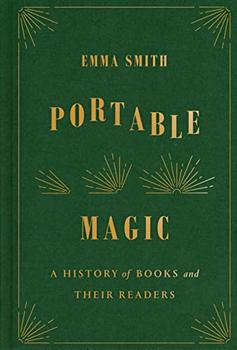Summary | Excerpt | Reviews | Beyond the Book | Readalikes | Genres & Themes | Author Bio

A History of Books and Their Readers
by Emma Smith
The sense of books' shadowy magic continued to accrue force as the printing press compounded its cultural dominance. Glossing "The Master and His Pupil" in his 1890 compilation of English Fairy Tales, folklorist Joseph Jacobs suggests that the magician's spell has "long been used for raising the ——": his omission of the word "devil" reveals that he, like the learned man in the North Country, is invested in the power of the printed word. Jacobs's book, which was also responsible for popularizing such familiar stories as Tom Thumb, Dick Whittington, the Three Little Pigs, and Jack and the Beanstalk, is implied to possess the power of the sorcerer's book of magic: the reader is advised "not [to] read the lines out when alone," since "one never knows what may happen."
Excerpted from Portable Magic by Emma Smith. Copyright © 2022 by Emma Smith. Excerpted by permission of Knopf. All rights reserved. No part of this excerpt may be reproduced or reprinted without permission in writing from the publisher.




A library is a temple unabridged with priceless treasure...
Click Here to find out who said this, as well as discovering other famous literary quotes!
Your guide toexceptional books
BookBrowse seeks out and recommends the best in contemporary fiction and nonfiction—books that not only engage and entertain but also deepen our understanding of ourselves and the world around us.